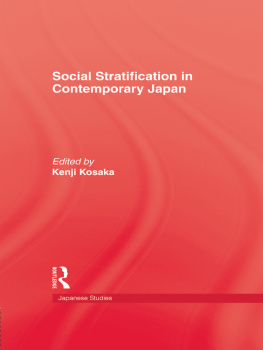THE ORIGIN OF
ETHNOGRAPHY IN
JAPAN
Yanagita Kunio and his Times
Japanese Studies
General Editor: Yoshio Sugimoto
Images of Japanese Society: Ross E, Mouer and
Yoshio Sugimoto
An Intellectual History of Wartime Japan:
Shunsuke Tsurumi
A Cultural History of Postwar Japan:
Shunsuke Tsurumi
Beyond Computopia: Tessa Morris-Suzuki
Constructs for Understanding Japan:
Yoshio Sugimoto and Ross E. Mouer
Japanese Models of Conflict Resolution:
S. N. Eisenstadt and Eyal Ben-Ari
Changing Japanese Suburbia: Eyal Ben-Ari
The Rise of the Japanese Corporate System:
Koji Matsumoto
Science, Technology and Society in Postwar Japan:
Shigeru Nakayama
Group Psychology of the Japanese in Wartime:
Toshio Iritani
Enterprise Unionism in Japan:
Hirosuke Kawanishi
Social Psychology of Modern Japan:
Munesuke Mita
The Origin of Ethnography in Japan:
Minoru Kawada
First published in 1993 by
Kegan Paul International Ltd
Distributed by
John Wiley & Sons Ltd
Published 2018 by Routledge
2 Park Square, Milton Park, Abingdon, Oxon OX14 4RN
52 Vanderbilt Avenue, New York, NY 10017
First issued in paperback 2018
Routledge is an imprint of the Taylor & Francis Group, an informa business
Copyright Minoru Kawada 1993
The publishers gratefully acknowledge the assistance of the Japan Foundation in the publication of this volume.
The author gratefully acknowledges the assistance of the Suntory Foundation and the Daiwa Anglo-Japanese Foundation in the production of the English text of this volume.
Phototypeset by Intype, London
All rights reserved. No part of this book may be reprinted or reproduced or utilised in any form or by any electronic, mechanical, or other means, now known or hereafter invented, including photocopying and recording, or in any information storage or retrieval system, without permission in writing from the publishers.
Notice:
Product or corporate names may be trademarks or registered trademarks, and are used only for identification and explanation without intent to infringe.
British Library Cataloguing in Publication Data
Kawada, Minoru
Origin of Ethnography in Japan: Yanagita
Kunio and His Times. Studies
I. Title II. Kishida, Toshiko
III. Series
305.895
ISBN 0710304501
Library of Congress Cataloging-in-Publication Data
Kawada, Minoru, 1947
[Yanagita Kunio no shisshiteki kenky. English]
The origin of ethnography in Japan: Yanagita Kunio and his times
Minoru Kawada; translated from the Japanese by Toshiko ICishida.
p. cm.(Japanese studies series)
Translation of: Yanagita Kunio no shisshiteki kenky,
Includes bibliographical references and index.
ISBN 0-7103-0450-1
1. Yanagita, Kunio, 18751962. 2. FolkloristsJapan
Biography. 3. FolkloreJapan. 4. Ethnology Japan.
5. JapanSocial life and customs. I. Title. II. Series: Japanese
studies series (Kegan Paul International)
GR55.Y3K3813 1992
398.092dc20
[B]
92-3799
CIP
ISBN 13: 978-1-138-87927-0 (pbk)
ISBN 13: 978-0-710-30450-6 (hpk)
Yanagita Kunio (18721962) is widely known as the founder of folklore studies in Japan, and his achievement in presenting a systematic framework for the discipline is highly valued amongst academic writings. However, many of his ideas still need to be examined, and in recent years there has been a renewal of interest in his works, especially among scholars of intellectual history. This re-evaluation of his achievements is generally attributable to the current view that Yanagita retained an independent position as an intellectual struggling to solve the various problems that dominated Japan in the years of great change from Meiji and Taisho to Showa.
The originality of Yanagitas study lies mainly in the fact that he attempted to overcome the problems caused by direct importation of European ideas into Japan by focusing upon the unique features of Japanese life. His works examine Japan from inside, that is, from a standpoint close to the actual lives of the Japanese people, their traditions and the nature of their country. Many scholars of intellectual history identify Yanagita as the first intellectual to question the measures taken in the process of Japans modernization through the analysis of the innate orientation of Japanese people, and point to him as a critic of the entire system of the Meiji establishment.
Re-evaluation of his work was prompted by the changes that took place in Japan as a result of the period of rapid economic growth: the imbalance in development of primary and secondary industry; the tremendous growth in heavy industry accompanied by the gradual decay of agriculture; the failure to establish a healthy productivity cycle; the destruction of the natural environment and traditional patterns of life; and particularly, the emergence and rapid growth of social apathy due to the lack of a firmly-established base on which to build the burgeoning supramodern popular society. Some writers describe Yanagitas study as founded upon the concept of a social transformation, designed to overcome the complications of modernization based on Western models by presenting Japan with plans for an alternative modernization. This view draws its evidence from Yanagitas theory of indigenous development, in which he emphasizes the importance of autonomous regional development, aiming for realization of an harmonious co-existence between man and nature and the banishment of alienation by communal rebirth.
Scholars have sought a rationale for resisting the social changes in contemporary Japanese society which are hastening the decomposition of an agrarian community and are seen as a threat to the fundamental lifestyle and spirit of the Japanese people. In this context, Yanagitas folklore studies are being examined in order to provide a new insight into the problems of present society, and a vision for the future of Japan.
Against these assessments of the values of Yanagitas work, however, mention must be made of the limitations some scholars perceive to exist. While admitting the significance of Yanagitas achievements, such critics claim that his essential ideology is landowner centred, and contend that it is impossible to attain a comprehensive understanding of Yanagitas theory without undertaking a thorough critique of his works.
In summary, we must conclude that contemporary views of Yanagitas achievements are far from unanimous, with opinions differing on the most fundamental points. Thus arises the need to re-examine Yanagitas discourse for the purpose of presenting a more comprehensive picture of his work. As the first step, this chapter will analyse the agro-politics which mark the starting point of Yanagitas theory, and investigate the significance of his achievement by reviewing Yanagitas construct of Japanese society.









